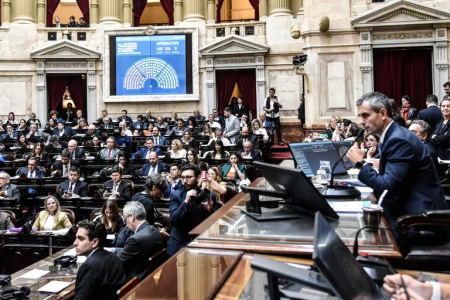All the Answers
Well-known member
The Government could transfer thousands of permanent employees to an “availability situation” - Infobae

Source:

El Gobierno podría pasar a “situación de disponibilidad” a miles de empleados de planta permanente
De aprobarse la Ley Bases, una parte del proyecto plantea la creación de un régimen especial para el personal estatal de organismos que pudieran desaparecer
May 02, 2024
If the Bases Law is approved, part of the project proposes the creation of a special regime for state personnel of organizations that could disappear
By Federico Galligani

Hundreds of thousands of public employees could be reached by this measure
The Government continues with the audit process of all State agencies, awaiting approval by Congress of the new Bases Law, which would allow it not only to dissolve some areas, but also to have a legal framework for those public employees who are left without tasks as a result of this reform.
According to what official sources told Infobae , the project, which already has half a sanction from the Chamber of Deputies, would allow the Executive Branch to create a special regime to encompass all those permanent workers of the entities that could disappear.
According to some estimates, there are more than 100 thousand people who are in this position , whose contracts are already being reviewed and who during a period of one year would become "available", until the national authorities define their status. future.
Article 52 of the Base Law establishes that “the personnel reached by the stability regime who are affected by the restructuring measures that involve the suppression of bodies, organizations or the functions assigned to them; or reduction due to being exceeded, as it arises from the founded report of the body competent in the matter, the optimal provision necessary, will automatically be available for a maximum period of up to twelve (12) months, as established by the regulations. .

The norm has already received half a sanction in the Chamber of Deputies
During that time, workers “must receive the training given to them; or carry out tasks in outsourced services of the State and, once that term has expired, if the employee does not obtain “a new employment relationship” in another sector, “he will automatically be separated from the national Public Administration.”
In that case, "you will have the right to receive compensation equal to one month's salary for each year of service or fraction greater than three months, based on the best monthly, normal and customary remuneration received during the last year or during the period of service." provision of services if this is less, except for the best right established in the Collective Labor Agreement and the special compensation that may be regulated by said means.
The measure is complemented by article 3 of the project , harshly questioned by Kirchnerism prior to the vote in Deputies, which empowers the Government to modify or eliminate “the powers, functions or responsibilities” of state agencies.

ATE has been denouncing persecution by the Government (Télam)
With this reform, the Executive Branch could also decide “the reorganization, modification or transformation of its legal structure, centralization, merger, division, total or partial dissolution, or transfer to the provinces or the Autonomous City of Buenos Aires, prior agreement that guarantees the proper allocation of resources.”
“National universities, bodies or agencies of the Judicial Branch, Legislative Branch, Public Ministry and all entities that depend on them are excluded from the powers of this article,” it was clarified.
The dissolution of the National Scientific and Technical Research Council (CONICET) was also prohibited; the National Administration of Laboratories and Health Institutes “Dr. Carlos G. Malbrán” (ANLIS); the National Administration of Medicines, Food and Medical Technology (ANMAT); the Industrial Property Institute (INPI); the National Institute of Cinema and Audiovisual Arts (INCAA); National Communications Entity (ENACOM); the Nuclear Regulatory Authority (ARN), the National Commission for Space Activities (CONAE); the National Atomic Energy Commission (CNEA); the National Commission for University Evaluation and Accreditation (CONEAU); the National Securities Commission (CNV); the National Institute for the Single Ablation and Implant Coordination Center (INCUCAI); the Financial Information Unit (UIF); and the National Institute of Agricultural Technology (INTA).

